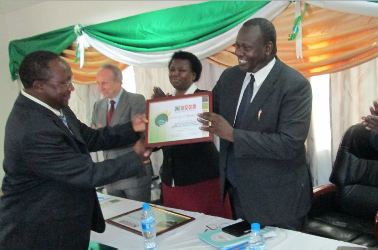South Sudan launches council to organise grain trade
January 30, 2013 (JUBA) – South Sudan Grain Council (SSGC) was launched on Wednesday in Juba in order to promote grain trade, organise farmers to produce more and improve on the structures needed in marketing the food commodities in the country and abroad.

The Council which was launched through the initiative of the ministry of Agriculture and Forestry will be able to address challenges relating to availability of and access to grain as well as warehousing systems and marketing of the commodities in the new country.
The membership of the Council will involve all the stakeholders including grain producers, traders and millers. Grain encompasses any cereal crop including but not limited to maize, wheat, rice, barley, sorghum and millet.
Addressing the launch of the SSGC, Vice-President Riek Machar urged all the stakeholders to be serious in developing the plans to achieve the Council’s objectives, adding that the formation of the grain council was necessary if the nation was to come close to achieving food sufficiency by 2014 as stated by President Salva Kiir two months ago.
Machar during the economic cluster meeting on Wednesday also directed the minister of Agriculture and Forestry, Betty Achan Ogwaro, to prepare memos for establishment of respective boards for fruit, honey, gum Arabic, among many others.
The minister of Animal Resources and Fisheries was also directed to establish a board for livestock industry which would promote policies and implement programs for developing this economic sector.
SOUTH SUDAN TO JOIN EAGC
South Sudan also plans to join the Eastern Africa Grain Council (EAGC) as full member once it has completed its internal organization of the national council and developed its grain export potentials.
EAGC is a non-profit, non-political and non-denominational organization, which will prepare, disseminate and promote the exchange of information on matters affecting the regional grain industry. It incorporates the key stakeholders in the regional grain industry including public sector and allied parastatals.
Established in 2006 and based in the Kenyan capital, Nairobi, EAGC operates in the Eastern Africa region. It is currently mandated to work in the 10 countries which include Tanzania, Kenya, Uganda, Rwanda, Burundi, South Sudan, Ethiopia, Zambia and Malawi.
Some of the objectives of the EAGC are to promote a well-functioning regional grain supply chain, focusing on trade issues affecting all sectors of the chain, and building a platform for reducing constraints in regional grain trade.
It also aims to build cooperation, interaction, partnerships, alliances, networks and market linkages; collect market data, generate information exchange and share regional expertise. It will also promote investment in structured marketing systems including warehouse receipts and commodity exchange.
It also represents the regional membership at national, regional and international forums, and lead advocacy and lobbying actions for best interests of the Council members.
The organization has a network of intelligence which monitors the cross-border trades as well as disseminates the market prices on daily basis within the region.
EAGC’s Executive Director and head of its secretariat, Gerald Masila, and his team were also invited to Juba during the launch of the initiative.
If it joins, South Sudan will have a representative in the EAGC’s board as well as appoint its country’s manager in Juba.
(ST)
